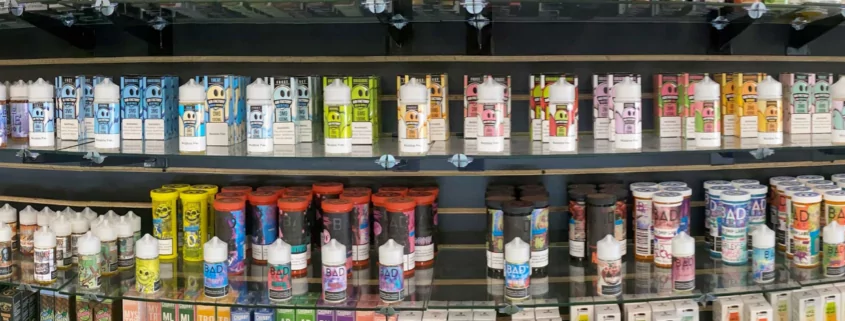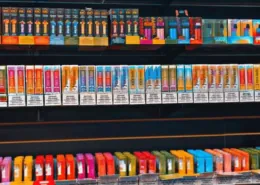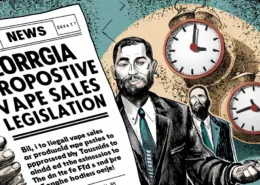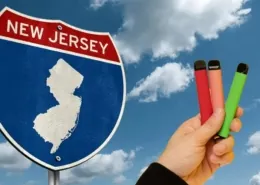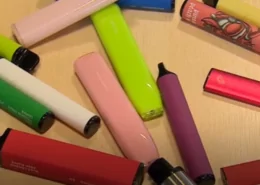Louisiana’s New Law Likely to Ban Elf Bars and Flavored Vapes
Louisiana is set to undergo significant changes in the regulation and taxation of nicotine vapes as Governor John Bel Edwards recently signed a law that could potentially remove most vape products, including the popular Elf Bars, from store shelves. This new legislation, known as Act 414 and introduced by Rep. Paul Hollis, R-Covington, initially aimed to increase the tax on vapes as a means to discourage their use. However, the law quickly evolved into a broader framework that restricts the sale of vapes, driven by the involvement of wholesalers, major tobacco companies, and lawmakers concerned with teenage vape consumption.
The Tax Impact
One of the key provisions of the law signed by Governor Edwards is the tripling of the tax on vape liquid from 5 cents per milliliter to 15 cents per milliliter. The revenue generated from this tax increase is specifically allocated to funding pay raises for state troopers. While this tax hike has notable consequences, the larger implications of the law revolve around a new registry advocated for by the tobacco industry and wholesalers.
The FDA-Approved Registry
Effective from November, the new law mandates that all vapes sold in Louisiana must be included on a Food and Drug Administration (FDA)-approved list, allowing them to be marketed legally. Retailers found selling unapproved products may face fines imposed by the state Office of Alcohol and Tobacco Control. Consequently, only a select number of companies, such as R.J. Reynolds and Altria, major tobacco companies that sell Vuse and NJoy vapes respectively, will be permitted to sell vape products in Louisiana. These companies actively lobbied for changes to the bill, particularly the implementation of the registry.
Implications for Flavored Vapes
The law could potentially result in a de facto ban on the majority of flavored vapes available in Louisiana. During a committee hearing, a wholesaler testified that the new registry would effectively curtail the popularity of disposable vapes, including EscoBars, Puff Bars, and Elf Bars. These products have drawn criticism from regulators and lawmakers nationwide, with the FDA recently taking action against Elf Bars by instructing retailers to cease their sale and halting imports. Rep. Paul Hollis explained that negotiations involving Altria, Reynolds, and wholesalers, who argued that the state was losing out on tax revenue due to retailers bypassing wholesalers and purchasing directly from vape manufacturers, were instrumental in shaping the final law. The legislation now mandates that products must go through wholesalers.
Impact on Flavored Vapes
Furthermore, the law is expected to significantly impact the availability of flavored vapes, which have come under scrutiny from lawmakers concerned about teenage vape usage. It is worth noting that the FDA-approved list does not include fruit-flavored vapes, suggesting a potential ban on such products. Reynolds, for instance, claims to only sell tobacco and menthol-flavored vapes. A spokesperson from Reynolds emphasized that the elimination of “illegally marketed disposable” vapes, which are often imported from other countries and lack proper regulatory oversight, is necessary to safeguard youth while offering adult smokers alternatives to combustible cigarettes. The company also called upon the FDA to compile a list of legally sellable vape products in the United States.
Manufacturer’s Concerns
iMiracle, the maker of Elf Bars, expressed concerns that the true objective of the law had been obscured from the general public and Louisiana voters. The company urged Louisiana legislators to thoroughly assess the law’s proponents and beneficiaries, questioning whether they intended to restrict adult constituents’ access to harm-reduction products. iMiracle stated that it is currently evaluating the law’s applicability and legality.
Enforcement and Compliance
The responsibility of enforcing the new law and penalizing retailers who sell non-FDA-approved products falls on the state Office of Alcohol and Tobacco Control. Ernest Legier, the head of ATC, acknowledged that he has not yet had sufficient time to review which products will be permitted. However, industry representatives have indicated that up to 60% of the currently available vape products may be removed from store shelves. Legier emphasized that the ATC will closely monitor the federal list and conduct compliance checks on retailers.
Addressing Teen Vape Use
This legislation is part of a broader nationwide effort to combat teenage vape use, a matter of concern for public health experts. Meanwhile, companies like Reynolds and Altria argue that their e-cigarettes serve as harm reduction tools for adult cigarette smokers.
- HHC Vapes: What Are They & Are They Safe? - July 31, 2025
- Cannabis and Vape Shop Workers Rank Happiest in Nation - July 31, 2025
- Richmond, VA, Restricts New Vape & Tobacco Shop Locations - July 31, 2025

